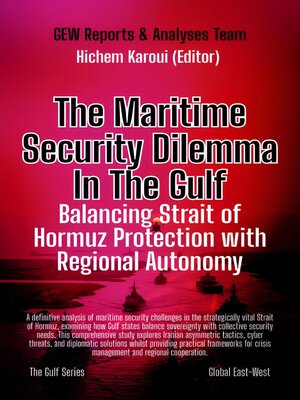The Maritime Security Dilemma In the Gulf
ebook ∣ Balancing Strait of Hormuz Protection with Regional Autonomy · The Gulf
By GEW Reports & Analyses Team

Sign up to save your library
With an OverDrive account, you can save your favorite libraries for at-a-glance information about availability. Find out more about OverDrive accounts.
Find this title in Libby, the library reading app by OverDrive.



Search for a digital library with this title
Title found at these libraries:
| Library Name | Distance |
|---|---|
| Loading... |
In an era where roughly one-fifth of global oil transits through a narrow 21-nautical-mile passage, the Strait of Hormuz has emerged as the world's most critical maritime chokepoint. This strategic waterway, connecting the Persian Gulf to the Arabian Sea, represents far more than a shipping lane-it embodies the complex intersection of energy security, regional sovereignty, and international power dynamics that defines modern geopolitics.
The Maritime Security Dilemma in the Gulf offers a comprehensive examination of the delicate balance between protecting vital sea lanes and preserving regional autonomy. As Gulf Cooperation Council states navigate competing pressures from external military presence and internal sovereignty concerns, they face an unprecedented challenge: securing critical infrastructure while maintaining independent decision-making capabilities.
This authoritative analysis examines how Iranian naval activities, asymmetric warfare tactics, and non-state actor interventions create a multifaceted security environment where traditional deterrence models are inadequate. The book delves into emerging threats-from cyberattacks on maritime systems to climate-induced vulnerabilities-that are reshaping security calculations across the region.
Drawing on extensive research and real-world case studies, the authors present practical frameworks for crisis management, diplomatic engagement, and technological innovation that respect both collective security needs and national prerogatives. From satellite surveillance systems to confidence-building measures, the book charts viable pathways for sustainable maritime governance.
Essential reading for policymakers, defence analysts, and international relations scholars, this volume provides the strategic insights needed to understand one of the world's most volatile yet economically vital regions. As global energy dependencies evolve and regional power dynamics shift, The Maritime Security Dilemma in the Gulf serves as an indispensable guide to navigating the complexities of 21st-century maritime security.







